|
|
|
Sort Order |
|
|
|
Items / Page
|
|
|
|
|
|
|
| Srl | Item |
| 1 |
ID:
077389
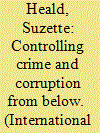

|
|
|
|
|
| Publication |
2007.
|
| Summary/Abstract |
This article deals with the history and development of sungusungu organisations in Kenyan Kuria from 1998 to the present time and the radical changes it has initiated. Developing out of indigenous organisation, sungusungu arose initially to provide a means of controlling theft, particularly cattle raiding. Operating with the sanction of the district administration, local norms of crime, trial and punishment were developed, distinct from those embodied in the national penal code. Guarding their independence, groups have kept their distance from the police and judiciary to avoid the systemic corruption of those institutions. In distancing themselves from the more corrupt aspects of the state, and acting against it within their areas of operation, these groups have had far-reaching effects on local security, to the extent that their success holds out possibilities for them to extend their activities into other spheres.
|
|
|
|
|
|
|
|
|
|
|
|
|
|
|
|
| 2 |
ID:
077391
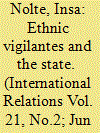

|
|
|
|
|
| Publication |
2007.
|
| Summary/Abstract |
Based on the example of the Oodua People's Congress (OPC) in Nigeria, this article argues that vigilante activities are embedded in a range of social relations and historical trajectories. While vigilantism transforms relationships of power within the state, it does not necessarily undermine all aspects of state authority. After the annulled presidential election of a Yoruba speaker in 1993, the OPC was founded with the explicit political aim of safeguarding Yoruba ethno-nationalist interests vis-à-vis the state. By fighting crime, and state institutions perceived to be implicated in the perpetration of crime, including the police and military, the OPC's vigilantes have undermined and challenged the state's security institutions. Representing the state as both weak and strong, the OPC has undermined the state's control of security but legitimised and strengthened the state as a mechanism of political decision-making and social reform.
|
|
|
|
|
|
|
|
|
|
|
|
|
|
|
|
| 3 |
ID:
077388
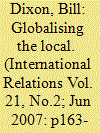

|
|
|
|
|
| Publication |
2007.
|
| Summary/Abstract |
A framework for analysing policy transfer developed by David Dolowitz and David Marsh has begun to attract the attention of criminologists interested in understanding how crime policies travel. This article uses this framework to assist in tracing the genealogy of a style of local, geographically responsible `sector' policing which is currently being implemented by the South African Police Service. After locating sector policing as a distinctive approach within the broader tradition of community policing, the article considers the origins and development of geographically responsible policing in Great Britain and the United States before focusing on its adoption and adaptation in post-apartheid South Africa. Answers to the seven questions suggested by Dolowitz and Marsh's framework are then sought in an effort to understand more fully the genealogy of sector policing in South Africa and the role of international policy transfer in it.
|
|
|
|
|
|
|
|
|
|
|
|
|
|
|
|
| 4 |
ID:
077387
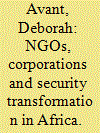

|
|
|
|
|
| Publication |
2007.
|
| Summary/Abstract |
Transnational non-state actors interested in maintaining a presence in parts of the world where the state is weak are an important part of the privatization of security that has not been well analyzed. In this article I lay out propositions about how an increasing role for non-state actors in security may transform the conceptualization of security and the use of violence more generally. I argue that international NGOs and transnational corporations conceptualize security and how to achieve it differently than states have traditionally done and that these differences have potential consequences for which problems are addressed, as well as for whether and how violence is used in the communities where they operate
|
|
|
|
|
|
|
|
|
|
|
|
|
|
|
|
| 5 |
ID:
077390
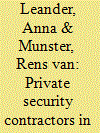

|
|
|
|
|
| Publication |
2007.
|
| Summary/Abstract |
This article explores the loud presence of private security contractors in the evolving and buoyant discussion surrounding Darfur. Relying primarily on statements by security contractors and industry lobby organizations, this article suggests that neo-liberal governmentality has bolstered the expert status of security contractors in the discussions surrounding Darfur. Both in Darfur and more widely, neo-liberal governmentality tends to `depoliticize' security as public debate narrowly focuses on the technicalities and costs of military solutions, while alternative political options, local knowledge and diplomatic alternatives become marginalized. Consequently, public debate may be intense (as is certainly true for Darfur) but lopsidedly centred on security restrictively understood. The depoliticizing trend tied to neo-liberal governmentality is an important change in security governance in Darfur of course, but also in Africa more broadly and beyond. However, since it works through what the editors of this issue refer to as the `complex relations between public and private, state and civil society actors' it tends to eschew analyses assuming that privatization is significant only when and if it undermines public authority and control. The account here testifies to the importance of changes in governance that involve public and private actors alike
|
|
|
|
|
|
|
|
|
|
|
|
|
|
|
|
| 6 |
ID:
077392
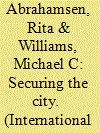

|
|
|
|
|
| Publication |
2007.
|
| Summary/Abstract |
The past decade has witnessed a remarkable expansion and globalisation of the private security sector. These developments mark the emergence of public-private, global-local security networks that play increasingly important roles in global governance. Rather than representing a simple retreat of the state, security privatisation is a part of broad processes in which the role of the state - and the nature and locus of authority - is being transformed and rearticulated. Often presented as apolitical, as the mere effect of market forces and moves towards greater efficiency in service delivery, the authority conferred on private actors can alter the political landscape and in the case of private security has clear implications for who is secured and how. The operation and impact of public/private, global/local security networks is explored in the context of security provision in Cape Town, South Africa.
|
|
|
|
|
|
|
|
|
|
|
|
|
|
|
|
|
|
|
|
|